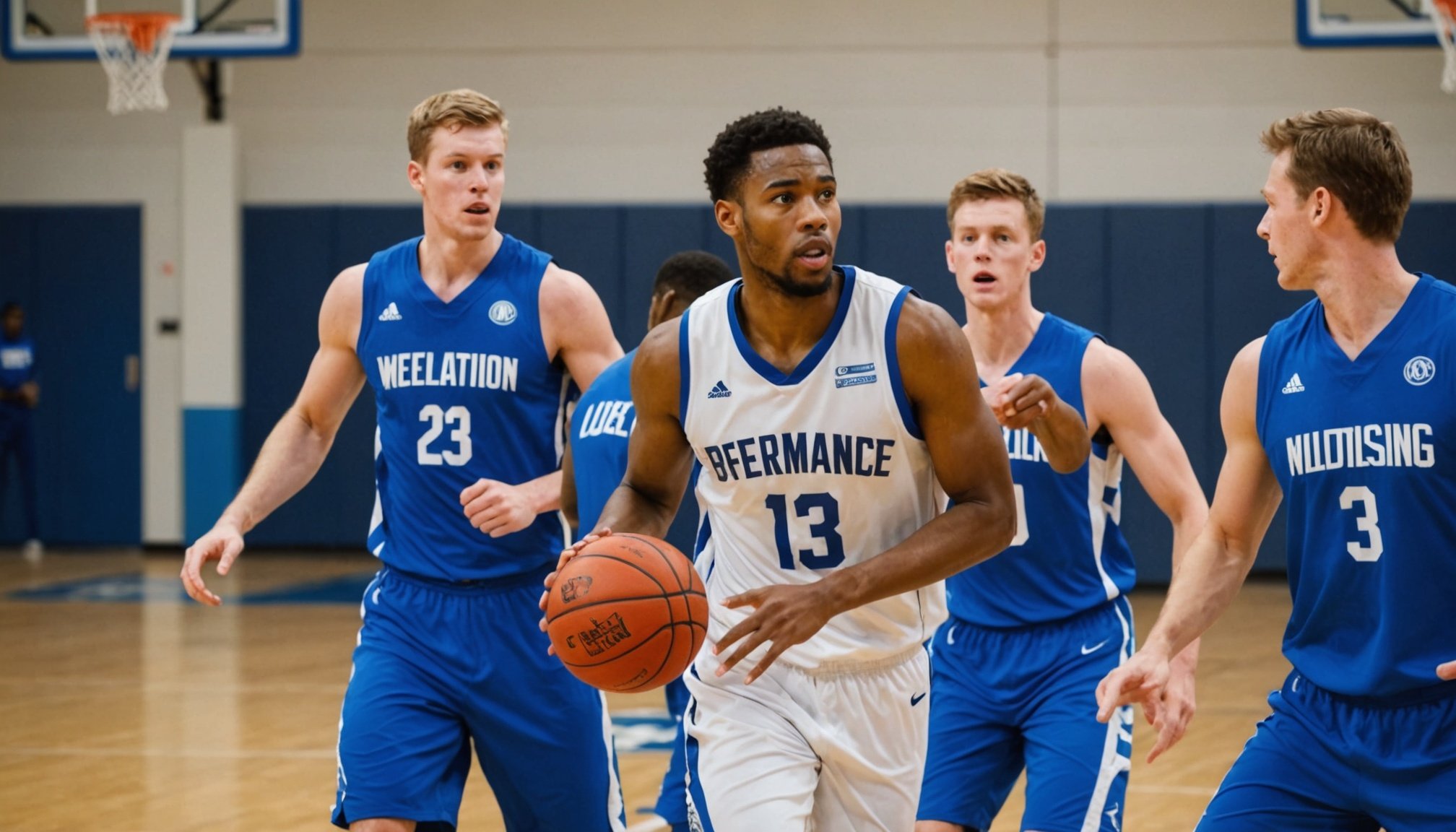Unlocking Peak Performance: Key Strategies for Effective Pre-Game Mental Warm-Ups in UK Basketball
The Importance of Mental Preparation in Basketball
When it comes to achieving peak performance in basketball, the focus often shifts between physical training and mental preparation. While strength and conditioning are crucial, the mental aspect of the game can be the deciding factor in high-pressure situations. Coaches and athletes alike understand that a well-prepared mind can significantly enhance athletic performance and help athletes navigate the challenges of the game with greater confidence and focus.
“Mental preparation is key to performing at your best,” says Dr. Jason Selk, a renowned sports psychologist. “It’s not just about the physical skills; it’s about how you prepare your mind to execute those skills under pressure.”[3]
In the same genre : Essential defensive drills to elevate every uk basketball team”s performance
Understanding the Role of Mental Warm-Ups
Mental warm-ups are designed to prepare the athlete’s mind for the upcoming game, much like physical warm-ups prepare the body. These strategies help athletes develop a winning mindset, build confidence, and maintain focus throughout the game.
Dynamic Mental Preparation
Unlike traditional static stretches, dynamic mental warm-ups engage the athlete in active mental exercises that mimic the game’s intensity and demands. Here are some key strategies:
In parallel : Unlocking mental resilience: key strategies for uk basketball players facing tough challenges
-
Mental Imagery: This technique involves visualizing oneself performing well on the court. Athletes imagine themselves making shots, defending effectively, and executing plays flawlessly. “Mental imagery can help athletes build confidence and prepare for different scenarios on the court,” notes a sports psychology expert[3].
-
Positive Self-Talk: Encouraging positive self-talk can significantly impact an athlete’s performance. Coaches can help athletes develop affirmations that boost their confidence and focus. For example, “I am ready for this game,” or “I can handle any situation on the court.”
-
Goal Setting: Setting clear, achievable goals before the game can help athletes stay focused and motivated. These goals can be both short-term (e.g., making a certain number of shots in the first quarter) and long-term (e.g., improving overall game performance).
Techniques to Enhance Mental Toughness
Mental toughness is a critical component of peak performance in basketball. Here are some techniques that coaches and athletes can use to enhance mental toughness:
Breathing Exercises
Deep breathing exercises can help athletes calm their nerves and focus their minds. Here’s a simple technique:
- Diaphragmatic Breathing: Athletes take slow, deep breaths through their nose, filling their diaphragm rather than their chest. This helps reduce anxiety and increase oxygen flow to the brain.
Visualization Sessions
Coaches can lead visualization sessions where athletes imagine themselves in different game scenarios. Here’s an example:
- Pre-Game Visualization:
- Imagine the game starting and feeling confident and ready.
- Visualize making shots, defending well, and executing plays smoothly.
- Imagine overcoming challenges and staying focused under pressure.
Positive Reinforcement
Positive reinforcement from coaches and teammates can significantly boost an athlete’s confidence and mental toughness. Here are some ways to implement positive reinforcement:
- Encouraging Feedback: Coaches provide constructive feedback that focuses on positive aspects of the athlete’s performance.
- Team Support: Teammates offer support and encouragement, creating a positive team environment.
Practical Strategies for Coaches
Coaches play a pivotal role in helping athletes develop the mental toughness and focus needed for peak performance. Here are some practical strategies coaches can use:
Building Trust and Teamwork
Trust is a key component of any successful team. Coaches can foster trust by promoting teamwork and encouraging open communication.
- Team-Building Activities: Organize activities that require teamwork and trust, such as trust falls or cooperative games.
- Open Communication: Encourage athletes to communicate openly about their feelings, concerns, and goals.
Integrating Mental Preparation into Training Programs
Coaches should integrate mental preparation into their training programs to ensure athletes are well-rounded and prepared for the mental demands of the game.
- Mental Training Sessions: Include dedicated mental training sessions in the weekly training schedule.
- Game Scenario Simulations: Simulate game scenarios during practice to help athletes prepare for different situations.
Table: Comparing Traditional and Dynamic Mental Warm-Ups
| Aspect | Traditional Mental Warm-Ups | Dynamic Mental Warm-Ups |
|---|---|---|
| Focus | General relaxation techniques | Specific game-related scenarios |
| Engagement | Passive (e.g., listening to music) | Active (e.g., visualization, positive self-talk) |
| Effectiveness | Limited impact on performance | Proven to enhance focus and confidence |
| Examples | Static stretches, general affirmations | Mental imagery, goal setting, breathing exercises |
| Benefits | Reduces immediate anxiety | Enhances mental toughness, improves performance under pressure |
Injury Prevention and Mental Preparation
While physical training is crucial for injury prevention, mental preparation also plays a significant role. Here’s how:
Managing Pressure and Stress
High-pressure situations can lead to mental and physical stress, which can increase the risk of injury. Mental preparation helps athletes manage this stress.
- Stress Management Techniques: Teach athletes techniques like deep breathing, visualization, and positive self-talk to manage stress.
- Confidence Building: Help athletes build confidence through positive reinforcement and goal setting, reducing the likelihood of mental and physical fatigue.
Focus and Concentration
Maintaining focus and concentration during the game can help athletes avoid injuries by staying alert and aware of their surroundings.
- Concentration Exercises: Include exercises that improve focus and concentration, such as mindfulness meditation or focus drills.
- Game Awareness: Teach athletes to stay aware of the game situation, anticipating potential dangers and taking preventive measures.
Long-Term Benefits of Effective Mental Warm-Ups
Effective mental warm-ups are not just beneficial for the immediate game but also have long-term benefits for athletes.
Enhanced Athletic Performance
Consistent mental preparation can lead to sustained improvement in athletic performance over time.
- Continuous Improvement: Regular mental training sessions help athletes continuously improve their skills and performance.
- Adaptability: Athletes become more adaptable to different game scenarios and pressure situations.
Mental Toughness Development
Mental toughness is a skill that develops over time with consistent practice and reinforcement.
- Resilience: Athletes become more resilient to setbacks and failures, bouncing back stronger and more focused.
- Confidence: Long-term mental preparation builds lasting confidence, helping athletes perform at their best even in challenging situations.
Achieving peak performance in basketball is a multifaceted endeavor that requires both physical and mental preparation. By incorporating dynamic mental warm-ups into their training programs, coaches and athletes can enhance focus, confidence, and overall athletic performance. Here are some key takeaways:
- Dynamic Mental Preparation: Engage in active mental exercises like mental imagery, positive self-talk, and goal setting.
- Build Trust and Teamwork: Foster a positive team environment through trust-building activities and open communication.
- Integrate Mental Training: Include dedicated mental training sessions in the weekly training schedule.
- Manage Pressure and Stress: Teach stress management techniques to reduce the risk of injury and improve performance under pressure.
By adopting these strategies, UK basketball players and coaches can unlock their full potential, leading to higher performance, better teamwork, and a more enjoyable and successful basketball experience.
Detailed Bullet Point List: Strategies for Effective Pre-Game Mental Warm-Ups
-
Mental Imagery:
-
Visualize the game starting and feeling confident and ready.
-
Imagine making shots, defending well, and executing plays smoothly.
-
Visualize overcoming challenges and staying focused under pressure.
-
Positive Self-Talk:
-
Develop affirmations that boost confidence and focus.
-
Use positive self-talk during practice and before the game.
-
Encourage teammates to support each other with positive affirmations.
-
Goal Setting:
-
Set clear, achievable goals for the game.
-
Break down long-term goals into short-term, manageable objectives.
-
Review and adjust goals regularly to maintain focus and motivation.
-
Breathing Exercises:
-
Practice diaphragmatic breathing to reduce anxiety and increase oxygen flow.
-
Use deep breathing exercises during breaks in the game to stay focused.
-
Visualization Sessions:
-
Lead group visualization sessions before the game.
-
Encourage athletes to visualize different game scenarios and outcomes.
-
Use visualization to prepare for high-pressure situations.
-
Positive Reinforcement:
-
Provide constructive feedback that focuses on positive aspects of performance.
-
Encourage teammates to support each other with positive feedback.
-
Celebrate small victories and achievements to build confidence.
-
Building Trust and Teamwork:
-
Organize team-building activities that require trust and cooperation.
-
Encourage open communication among teammates.
-
Foster a positive team environment that promotes trust and support.
-
Injury Prevention:
-
Teach stress management techniques to reduce mental and physical stress.
-
Encourage athletes to stay focused and aware of their surroundings during the game.
-
Incorporate exercises that improve focus and concentration into the training program.











